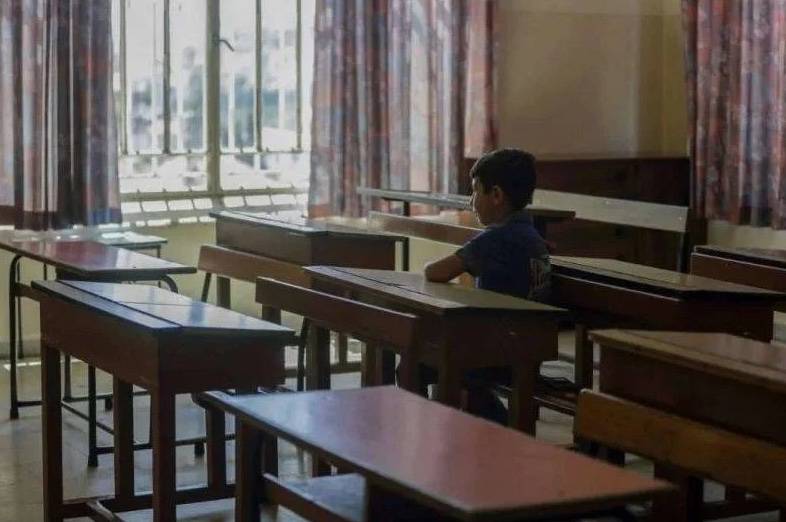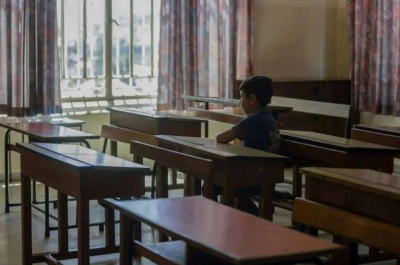
A student in a school in Lebanon. (Credit: Joseph Eid/AFP file)
With war calling at the country’s doorstep since Hamas’ al-Aqsa Flood operation in Israel on Oct. 7, schools in Lebanon are preparing themselves for a possible expansion of the conflict. Seven kilometers away from Lebanon’s southern border with Israel, and with the sound of shelling regularly thundering in the distance, Hyam Fawaz, director of the official primary school in Tibnin refuses “to think about the worst possibility.”
“We’re operating normally for the moment. But if the conflict spreads to Lebanon, we will have no choice but to close and consider distance learning, even if the experiment was inconclusive during the [COVID-19] lockdown,” she said, before wondering, “Will we have electricity and an internet connection?”
In this extremely volatile context, Lebanon’s schools are in limbo as they wait for the crisis strategy promised by the cabinet and the Education Ministry. “We have not received any directives from the Education Ministry or the General Secretary for Catholic Schools,” said Sister Bassima Khoury, director of the pedagogical office at the Antonine Sisters schools, whose congregation provides education to 15,000 students across the country. L’Orient-Le Jour tried in vain to contact the caretaker Education Minister Abbas Halabi, the ministry’s director-general Imad Achkar, and the secretary-general of Catholic Schools, Father Youssef Nasr, who is abroad.
On Friday, the cabinet published the general framework of the national disaster and crisis response plan. In a 229-page book, it outlines the thorny issues in the event of war, without giving any concrete answers to the concerns of the education community about students’ safety in the event of bombing, the continuation of teaching, the maintenance of internet connections or electricity, or the fate of the school year if school buildings have to house displaced persons, etc. “If a full-scale war breaks out, all this will be meaningless,” said an informed source in the education sector who prefers to remain anonymous.
Safety as a priority
The schools are getting ready, each according to its means, against the backdrop of an unprecedented economic crisis. The private institutions, which receive part (or all) of their fees in dollars, are pursuing all means available in terms of both security and teaching.
The students’ safety in the event of a bombing is currently the top priority for school directors and parents. While the issue is widely debated within institutions, and is even the subject of safety plans involving simulations with the participation of students, it is sometimes considered in a more discreet way in order to protect the children’s mental health. “We are studying a safety plan at the Antonine Sisters School in Roumieh, Mar Doumit, based on the confinement and evacuation of pupils in the event of a bombing, in coordination with teachers and parents. We should be launching a simulation very soon before unveiling it and distributing it to all our schools,” said Sister Khoury.
The same initiative has been undertaken by the schools of the Makassed Philanthropic Islamic Association of Beirut (which educate 6,000 students across 16 establishments). These schools are reactivating and updating their emergency plan after providing a number of teachers with a first aid training with the Red Cross and Civil Defense.
A private English-speaking school in Sin al-Fil has just sent an email to parents detailing the measures to be taken in case of emergency, including a plan to evacuate the upper floors, the role of teachers and older students to avoid panic, halt school transport, the role of parents, and so on.
“We avoid mobilizing the children, to preserve their peace of mind and that of the teachers. That doesn’t mean that we aren’t preparing ourselves for war,” said Patrick Joseph, head of the Mission laïque française au Liban school network, which has 9,500 pupils.
For other schools, the worry is facilitities. “We don’t even have a shelter, just a parking lot,” said Wassila Yamout, the director of the Chakib Arslane Public Secondary School.
Around 50 schools in the Lebanese southern border area have been closed since Oct. 10 due to the deteriorating security situation in region. Upon instruction, the Ministry of Education and the General Secretary for Catholic Schools, displaced students and teachers have been called to join temporarily a school of their choice in the region where they are located: public school pupils in any public school and Catholic school pupils in any Catholic school, even if it is run by a different Catholic religous order. It is still too early to assess the results of such instructions.
Online teaching or a return to paper documents
Teaching remains at the heart of the educational institutions’ activity. Over the years, many of them have improved the distance learning techniques they use during forced closures.
“We are ready for online teaching, as long as the internet connection is available,” said Sister Afaf Abou Samra, director general of the Saints-Cœurs schools, in which 22,000 students across the country are enrolled. “When our schools are closed for one reason or another — demonstrations, strikes, pandemics, bad weather, security problems — we immediately reactivate distance learning, unless there is an internet outage,” added Joseph.
In the event of a total internet blackout, the heads of private schools will not hesitate to consider all possible scenarios: “We could go back to exercise books, like holiday homework,” said Sister Khoury, director the Antonine Sisters school in Roumieh, Mar Doumit.
Sister Abou Samra said, “If the schools are closed and the internet is cut off, we will have to resort to paper documents. The main thing is to fight against educational void.”
Meanwhile, Ghina Badawi, director of education of the Makassed schools, said, We may be able to extend the school year if the internet connection is completely interrupted because of the war.”
The public schools, which lack funds against a backdrop of failing public institutions and an impoverished population, will have to send their students instructions and exercises by email or on WhatsApp, when there is connection. “We keep a record of our students’ telephone numbers and emails. But distance learning promises to be complicated. Pupils and teachers are severely handicapped by power and internet failures, not to mention the lack of suitable equipment. In this context, it is impossible to think of online courses,” said Yamout.
Once again, there is a growing gap between private and state schools.
This article was originally published in French in L'Orient-Le Jour. Translation by Joelle El Khoury.

